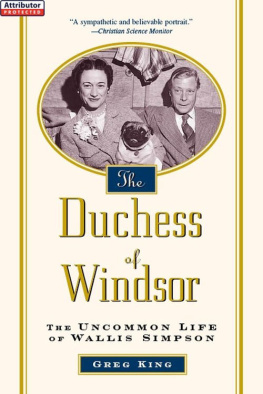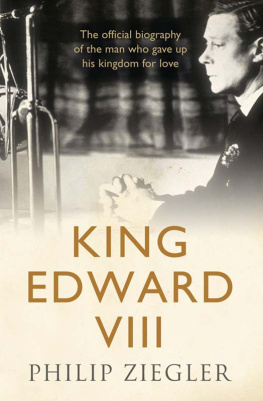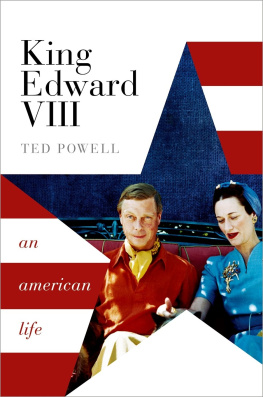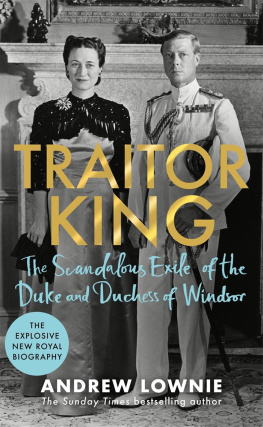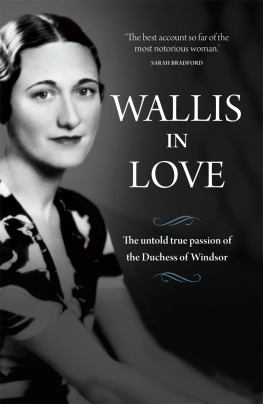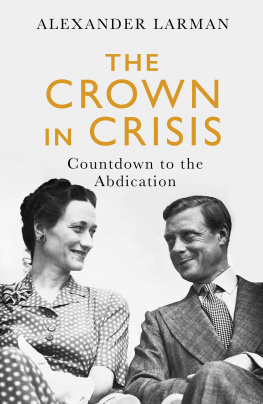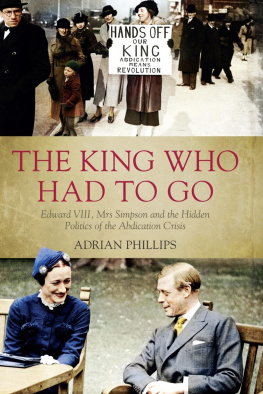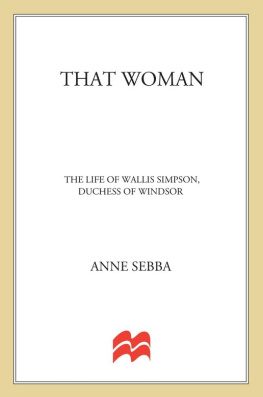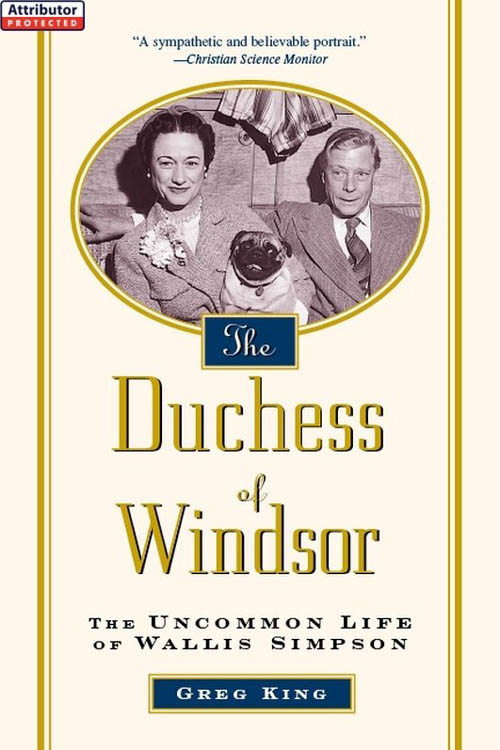Preface
I DONT WANT PEOPLE referring back to inaccuracies after I am dead. So said Wallis, Duchess of Windsor, in an interview in 1956, prior to the publication of her memoirs, The Heart Has Its Reasons . In spite of her wishes, however, Wallis had the dual misfortune of having inaccuracies written and spread about her not only after her death but during her lifetime as well.
Wallis had always fascinated me, and through my interest in the British Royal Family, I had casually studied the lives of the Duke and Duchess of Windsor. Like most people, I was prepared to believe the worst: tales of ambition, humiliation, treason, and sexual escapades. Certainly, the vast majority of those who have chronicled the Royal Family have expressed little sympathy for the Windsors. After twenty years of reading the worst that authors and historians had to offer on Wallis Windsor, I felt her portrait seemed set, and it was an unflattering one at that.
It would be difficult to imagine a woman more vilified in the twentieth century than the Duchess of Windsor. Beyond the intimate circle of those still alive who knew the Duchess well, she has been all but lost to myth. From the middle of the 1930s, when she first became a public figure, to the present day, Wallis has been condemned as common and vulgar, a scheming adventuress, a frivolous woman whose fierce determination to become queen of the United Kingdom of Great Britain and Northern Ireland provoked the abdication of King Edward VIII. Thereafter, her ambitions thwarted, she married the former King and embarked on one of the most self-indulgent and extravagant lives in recorded history. Popular legend has it that Wallis never loved the man who had given up the throne to marry her and did little more than nag him to his grave.
There is much more. Wallis, it is suggested, was a Russian spy, an American spy, a German spy, an Italian spy; she was mistress to both Hitlers and Mussolinis diplomats; she dealt illegal drugs; she prostituted herself in Chinese brothels; had illicit affairs before and after her marriage to the Duke; and was in reality a hermaphrodite. The sheer breadth of the accusations is staggering. Was this woman really as despicable as most historians have led us to believe?
The few voices raised in defense of the Duchess of Windsor, therefore, struck me as rather apologetic, almost dismissive of the apparently overwhelming evidence of her sordid life and shameful character. Ralph G. Martins biography The Woman He Loved presented a portrait of Wallis Windsor so contrary to the public image that it seemed impossible to treat it seriously. Lady Mosleys 1980 biography, coming from a close friend of the Duchesss, seemed far from impartial. And Michael Bloch, who authored six books on the Duke and Duchess of Windsor between 1983 to 1996, had done so at the request of their French lawyer, Maitre Suzanne Blum, and could therefore be considered partisan. Surely, I thought, the Windsors cannot have been the couple presented in these books: a rather human man and woman, both somewhat stubborn at times but neither one the unsympathetic nuisance of whom I had often read.
History is rarely composed of those with black or white characters. Undoubtedly, the Duchess of Windsor was neither a villain nor a saint. Somewhere between these polar views had to be the truth. Over the years, I toyed with the idea of writing a biography of the Duchess if only because it seemed to me that here was a womanlike the subject of my first book, Empress Alexandra Feodorovna of Russiawhose vile public image concealed what was undoubtedly something rather more mundane. Still, the territory was abundant with memoirs and biographies. What more could be said? Unlike Empress Alexandra, Wallis failed to strike an emotional chord in me; as far as I was concerned, whatever favorable qualities I was ready to allow her by virtue of sheer logic failed to outweigh what I continued to perceive as her hard character, faulty judgment, and aimless life. Then, too, the Duchess of Windsor was a little outside my favored realm of researchnineteenthcentury European Royals and the Russian Imperial Family. Without completely dismissing the thought, I moved on to other projects.
I admit that most of my antipathy toward the Duchess of Windsor was based on esteem for the British Royal Family. If the much-loved and revered Queen Mother despised her, she must have had good reason. But this naive view changed when I, like millions of others around the world, witnessedthrough publication of authorized and semiauthorized memoirs, stolen love letters and indiscreet photographs, televised admissions of adultery and taped telephone conversations, divorces and haggles over paying taxesthe unraveling of the beatific myth surrounding the House of Windsor. With the monarchy under increasing pressure, certain incidents over the last seventy years began to take on a new perspective, and assume definite shades of gray. As they did, I often thought about Wallis; realizing that the present Royal Family was quite capable of ruthless behavior and self-preservation, I wondered if the pattern would have been all that different where the Duke and Duchess of Windsor were concerned. Indeed, the same powerful matriarchy which had largely been responsible for the Windsors ostracism, headed by Queen Elizabeth, the Queen Mother, remains firmly in place. If the Royal Family were not the bastions of virtue and selflessness, an image they had themselves promoted, was it also possible that Wallis was not necessarily the evil adventuress they had always made her out to be?
With growing interest, I began to view the Duchess of Windsor in this light: someone who had blundered into a system she did not understand and which refused to change; who came under the influence of a man more stubborn than she, whose petulant determination to wed her would, ironically, be viewed as her own ambitious plan; and whose continued existence was a much-resented and painful reminder to the Royal Family of the crisis through which they had passed. For the rest of her life, the Duchess of Windsor was to be punisheddenied her rightful style of Royal Highness, her efforts in the Second World War completely ignored by King George VI, and, at the side of her husband, condemned to an exile which kept her in perpetual disgrace. With each new crack in the Royal Familys image, the Duchess became more sympathetic to me. It was rather obvious that she, like Diana, Princess of Wales, had suffered at the hands of the family into which she had married and their attendant court and been the subject of a carefully orchestrated whispering campaign.
In the spring of 1996, I was living in London, researching a future work on the court of Tsar Nicholas II and doing publicity for the U.K. editions of my first two books. During a visit to Hatchards, one of Londons premier book stores, I had a conversation with Robin Piguet of the Biography Department about my possible subsequent projects. I casually mentioned Wallis, but Robin told me that Michael Bloch would shortly be publishing a new biography of the Duchess of Windsor. Hearing this, I thought, Well, thats that, then. Bloch, I reasoned, had years of unprecedented access to the Windsors private papers in Paris and was surely the best-informed man on the subject. His biography would undoubtedly be the final word, answering the many charges made against her.

